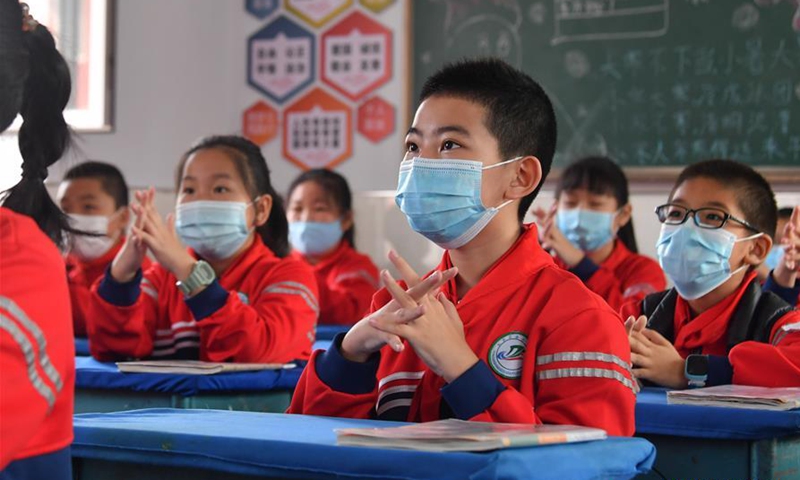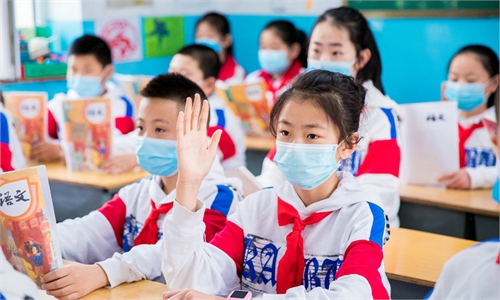
Students at a class in Hohhot, north China's Inner Mongolia Autonomous Region, May 7, 2020. Photo: Xinhua
China's work in implementing bilingual education of Putonghua and an ethnic language in ethnically populated regions in recent years has been smooth and effective in cultivating bilingual talent. Some twists happened in the Inner Mongolia Autonomous Region as a new regulation on bringing courses taught in Putonghua has not been fully explained to parents, and disinformation has misled the public, with the possible interference of overseas separatists.
Since this year's fall semester, students in first grade in ethnic primary and middle schools in Inner Mongolia would use the state-approved textbook for Chinese, and the course would be taught in Putonghua. Before the reform, students started learning the course from second grade. Mongolian language remains the medium of instruction in other subjects from first grade. The Inner Mongolia government released an explanation on its new education regulations on August 31.
The release also said that the courses on morality, law and history will be taught in Putonghua for first grade students and ethnic schools in 2021 and 2022, respectively.
The explanation came amid increasing concerns from some parents, especially those in Tongliao, where more Mongolian residents live in the region and some parents were misled by rumors that the new regulation would replace the Mongolian language with Putonghua.
Some parents reached by the Global Times said they are concerned that teaching the courses in Putonghua may add difficulty for first graders and may eventually lead to the cancelation of the favorable policies in the college entrance examination in the future.
Students of ethnic groups in China enjoy favorable policies in the national college entrance examination, as they can be admitted by colleges around the country with lower scores than their Han peers.
These lenient policies for ethnic students have been a source of debate in China for a long time, as Han students and parents believe these policies are unfair and discriminative against Han students, while ethnic people think the policies are necessary for minority groups. There is also news of misuse of these favorable policies and corruption.
Some Western media hyped the new regulation, claiming that Inner Mongolia is replacing Mongolian language by Putonghua.
Chinese Foreign Ministry spokesperson Hua Chunying told a press conference on Thursday that recent reports on what happened in the Inner Mongolia region are political hype.
"The common language of a country is a symbol of its sovereignty, and it is every citizen's right and responsibility to learn and use it. Other countries do the same," Hua said.
In recent years, the Chinese government has also organized experts in compiling textbooks on Chinese, morality, laws and history, which have been used in all grades and high schools in China. Since this year, six provinces and regions, including Inner Mongolia, have begun to use the textbooks and other courses taught using ethnic languages. The use of the Mongolian language, textbooks and the bilingual education system will not change, Hua said.
"Is there any other country in the world that makes laws to protect ethnic groups' rights on using their language?" she asked.
At the night of September 1, to dispel the misunderstanding, Bu Xiaolin, chairwoman of the Inner Mongolia Autonomous Region government, attended a TV meeting and stressed that the new regulation would not change the previous teaching model in courses other than Chinese, nor would it alter the teaching of ethnic languages. The current bilingual education system would not change.
The incident in Inner Mongolia happened partly because of a lack of explanation to the public, and rumors on the replacement of the Mongolian language also ignited some people's concerns on the Mongolian language's development, Yalagchi, a research fellow from the Chinese Academy of Social Sciences, told the Global Times.
China has implemented the bilingual education of Putonghua and an ethnic language in ethnic regions for many years with state-approved textbooks, and has adopted two teaching models in accordance with the local environment. Ethnic students can choose to go to ethnic schools where ethnic languages are the medium of instruction, and Putonghua is a subject, or attend schools with Putonghua as the medium, and the ethnic language taught as a subject.
The system has helped educate bilingual talent who have greatly contributed to ethnic unity and harmony in Xinjiang, Tibet, Inner Mongolia and other ethnic regions. The latest changes in Inner Mongolia are consistent with the nation's bilingual education regulations, experts said.
The new regulation aims to enhance ethnic students' mastery of the national language. Adding courses on morality, law and history taught in Putonghua is also practicable and useful as it would help enhance the recognition of the Chinese nation. All these can help students better adapt to the country's rapid development. Under the current bilingual education system, promoting the education of Putonghua will do no harm to the ethnic groups or the country, Yalagchi said.
The Global Times has learned that many ethnically populated areas and schools in China, including the three northeastern Chinese provinces, have been using Putonghua to teach Chinese, history, morality and history for a while.
Chen Ganglong, an ethnic Mongolian professor from Peking University, told the Global Times that the parents' fears are understandable, and some local governments should be more considerate and firmly implemente the regulation in accordance with laws and regulations.
A more detailed explanation should be made to parents, and matched policies can be adopted to support educational institutes to solve current problems, Yalagchi said.
The Inner Mongolian region has long been regarded as a model of ethnic unity and bilingual education, and the interlude has been caused by not enough communication during implementation, which would not change ethnic unity and stability in the region, Chen said.
Chen added that some outside forces are hyping the topic to sow discord, and complicate the issue for their own purpose.
The incident in Tongliao, Inner Mongolia, soon attracted the attention of anti-China forces and overseas separatists. Some Western media also gave rolling coverage of the incident, hyping the Chinese government's "replacing the Mongolian language with Putonghua" without touching on the truth.
A man named Enghebatu Togochog, who claimed to be director of the US-based "Southern Mongolian Human Rights Information Center," frequently appeared in Western media reports, attacking the region of "cultural genocide."
These allegations and accusations sound familiar as anti-China forces and overseas separatists also hyped a similar topic in China's Xinjiang region. Different separatist forces seemed to collude together and make all efforts with anti-China forces to slander China, observers said.
The "Southern Mongolian Human Rights Information Center" also bluntly writes on its website that one of its purposes is to "establish a democratic political system" in the Inner Mongolia. A release also revealed that Enghebatu has relations with the "Inner Mongolian People's Party," an overseas secessionist group.
Secessionists from Inner Mongolia have lingered on the edge of the international community for years. The united and harmonious situation in the region leaves them less space to make waves and trouble. They are hyping the incident in the Inner Mongolia region, playing as opportunist and hoping to echo with other separatist forces to make trouble for China by playing cards on Xinjiang, Hong Kong and Taiwan, observers said.
However, residents and experts reached by the Global Times in Inner Mongolia seem to be very alert on outside interference and separatists. They reiterated that these are China's domestic affairs and should be solved within the country. "Those who want to sow discord should get away as early as they can," they said.
The public security bureau of Bayannur of Inner Mongolia released a notice on Thursday, saying it would firmly crack down on illegal activities related to the new regulation, including distorting it to incite residents to cause social disturbances, taking illegal assembly or protests, spreading rumors online, hurting others, preventing students to go to school and undermining national security.
The public security bureau of Horqin district in Tongliao issued a notice to assist in the investigation, and is searching for individuals allegedly involved in gathering and causing disturbance on August 31.
Zhao Kezhi, State Councilor and Minister of Public Security, visited Hulunbuir and Hohhot, Inner Mongolia Autonomous Region, and Yinchuan, Ningxia Hui Autonomous Region, from August 29 to Wednesday.
Zhao stressed that public security organs should carry on the fight against separatism, firmly implement anti-terrorist measures, and promote stability and harmony in the ethnic and religious fields.


